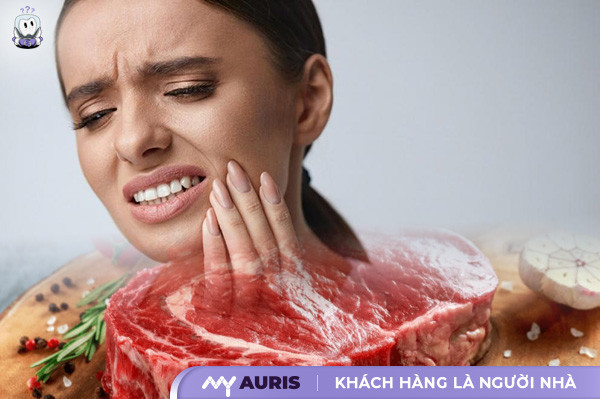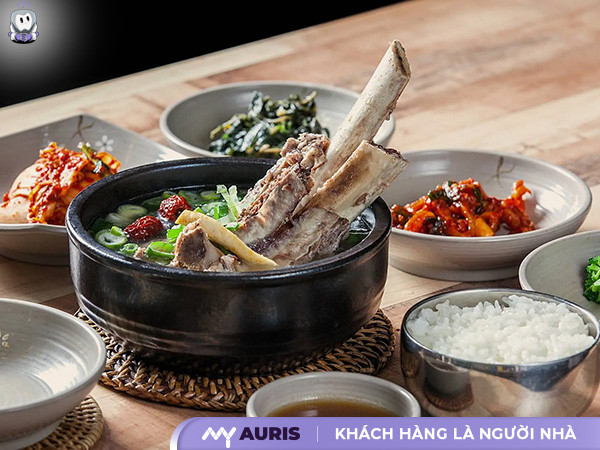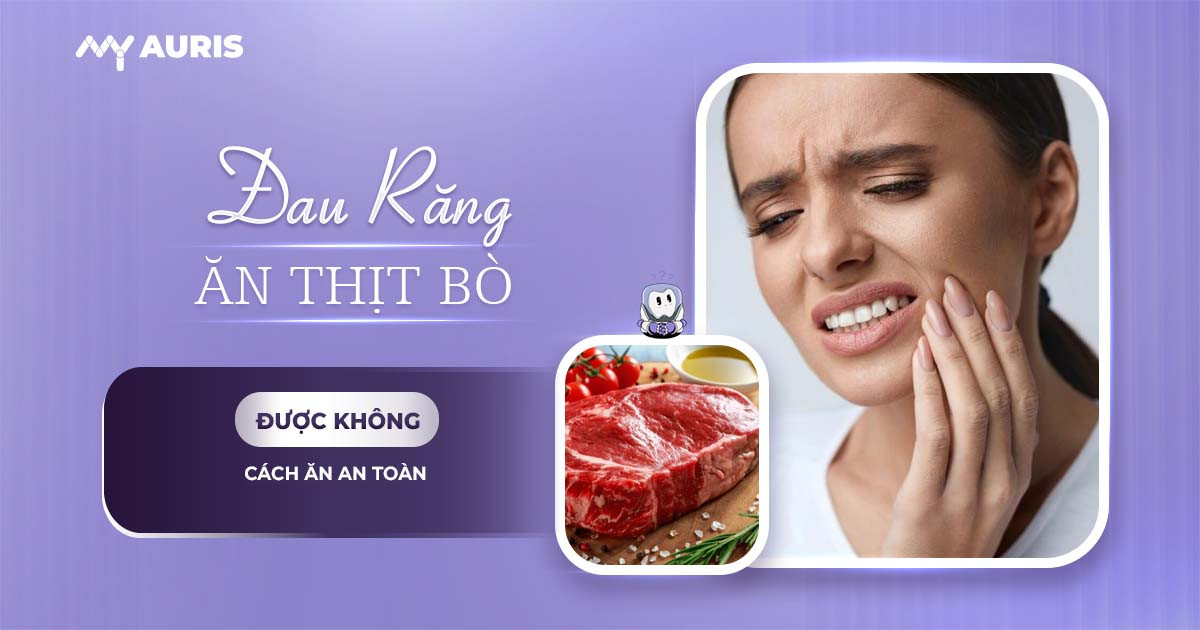Most of us have experienced toothache at least once – a condition that makes eating difficult and uncomfortable. Many people worry that eating beef might cause food to get stuck between teeth, increasing pain and inflammation. So, should you really eat beef when you have a toothache? The answer will be analyzed in detail by experts from My Auris Dental Clinic in the article below, helping you understand better and care for your oral health correctly.
Can You Eat Beef When You Have a Toothache?
Beef is a rich source of essential nutrients, especially protein, iron, zinc, magnesium, and various vitamins that support red blood cell production, boost immunity, prevent anemia, and protect oral health.
According to clinical experience from dental experts, eating beef does not directly cause toothache or damage to teeth and gums. On the contrary, the nutrients in beef can help strengthen teeth, reduce the risk of gingivitis, periodontitis, and tooth decay if combined with proper oral hygiene.
However, many still wonder if they can eat beef with a toothache, because beef has a chewy, fibrous texture that can easily get stuck between teeth and cause discomfort if there is inflammation or a minor dental procedure. If leftover meat particles are not thoroughly removed, they will form plaque, accumulate over time to create tartar, leading to gingivitis, bad breath, tooth decay, and other oral health issues.
Not only beef, but other types of meat such as pork, lamb, and poultry (chicken, duck, etc.) can also stick to teeth, especially when teeth are weak or damaged. Therefore, the diet when experiencing a toothache needs to be adjusted flexibly.
Dental doctors advise that you do not need to completely avoid beef when you have a toothache, but should prepare it into easily chewable dishes such as beef porridge, minced beef soup, or tender stewed beef to reduce the chewing force on your teeth and gums. These dishes still provide sufficient iron, protein, vitamins, and minerals to help the body recover better while your teeth are weak.

What to Note When Experiencing Toothache While Eating Beef?
Who Should Avoid Beef to Prevent Oral Health Issues?
Toothache when eating beef is not uncommon. However, not only those with toothache need to be careful, but some groups of people listed below also need to avoid beef to prevent exacerbating health problems.
Beef allergy: Some people have allergic reactions to proteins or components in beef. In such cases, beef may not only cause toothache but also lead to severe symptoms such as rashes, difficulty breathing, or poor digestion. Even beef-derived products like beef powder should be removed from the diet when experiencing toothache.
High blood pressure and beef: Red meat, especially beef, contains a lot of cholesterol and saturated fat. Individuals with high blood pressure should limit consumption to avoid increasing cardiovascular strain and prevent the risk of serious complications.
Dyslipidemia and beef: If you are being treated for or have a history of dyslipidemia, regular consumption of beef can cause the cholesterol content in beef to disrupt blood lipid balance, affecting overall health, especially the cardiovascular system and oral health.
Internal medical conditions and beef: Individuals with internal medical conditions such as diabetes, liver disease, kidney disease, etc., need nutritional advice before adding beef to their daily diet. An unsuitable diet can worsen the condition and prolong toothache.

Suitable Beef Dishes When You Have a Toothache
People with toothache do not necessarily have to completely avoid beef, but choosing appropriate beef dishes is very important. By preparing beef to be very tender and easy to chew, you can reduce pressure on your teeth, thereby limiting sensitivity and pain.
Here are some ideal beef dish suggestions for people with toothache:
Stewed Beef Soup: This soup is made from tender stewed beef with vegetables such as carrots, potatoes, or even pickled mustard greens. It not only makes the meat soft and easy to eat but also provides many nutrients to support health recovery. Particularly, thorough stewing helps prevent meat from getting stuck between teeth – a factor that often exacerbates pain.
Beef Porridge: When you have a toothache, beef porridge is an excellent choice. Minced beef combined with soft-cooked porridge allows you to eat easily without much chewing force, thereby reducing damage to inflamed and painful teeth.
Beef Soup: Another suggestion for those who want to enjoy good food while minimizing toothache is beef soup. You can shred or tenderize beef to make soup. The combination of tender meat and nutritious vegetables will make the dish more appealing while ensuring oral safety.

Oral Hygiene After Meals is Necessary to Prevent Harmful Bacteria
Maintaining oral hygiene after eating is extremely important, especially for those experiencing toothache. Even if you don’t have dental issues, food debris stuck between teeth and on chewing surfaces still creates a favorable environment for bacteria to multiply, leading to pain and inflammation. This is especially true when eating beef dishes, as meat fibers can easily get stuck in teeth if not thoroughly cleaned. Therefore, after each meal, you should use dental floss, mouthwash, or brush your teeth correctly to completely remove any remnants.
Proactive oral cleaning not only helps reduce the risk of dental problems but also contributes to long-term oral health, especially for those experiencing toothache symptoms.
Above are professional insights from My Auris Dental Clinic – where treatment quality and customer health are always prioritized. We hope that through this article, you have gained a clearer understanding of whether to eat beef when you have a toothache, and more importantly, how to maintain proper daily oral hygiene to prevent future dental issues.





